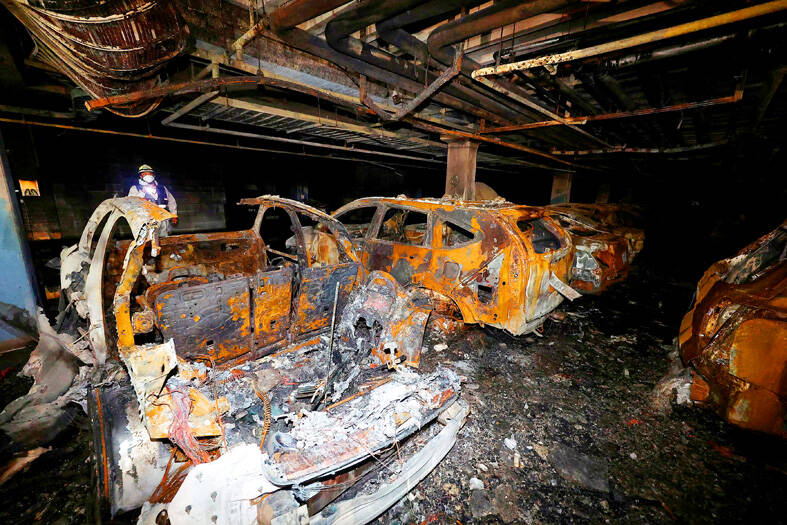South Korea’s government and the ruling People Power Party (PPP) have agreed to move up an electric vehicle (EV) battery certification program, the party said on Sunday, as authorities seek to alleviate public safety concerns after a series of fires involving EVs.
The government would start the battery certification scheme in October, earlier than scheduled, to help guarantee the safety of EV batteries, PPP spokesman Han Zee-a said.
The government also agreed to require automakers operating in the country to identify batteries used in their EVs, he said.

Photo: Reuters
The agreement on tougher rules for EV safety follows the government’s move to urge car makers to voluntarily disclose the information after an EV fire on Aug. 1 that damaged hundreds of vehicles and created public panic.
The blaze, which appeared to start spontaneously in a Mercedes-Benz EV with Farasis Energy Inc batteries in the city of Incheon, took eight hours to extinguish, destroying or damaging about 140 cars and forcing some residents in the apartments above to move to shelters.
Officials said the fire was made worse because equipment such as sprinklers in the underground parking lot did not work properly.
Early this month, Kia Corp’s electric crossover EV6 with South Korean battery maker SK On Co’s batteries also caught fire in a parking lot, fire authorities said.
In recent days, some car companies such as Hyundai Motor Co, Mercedes-Benz Korea, Kia Corp and Volkswagen Korea, have voluntarily started naming the manufacturers of batteries they use.
South Korean battery makers had no reason to oppose specifying where their power sources were used, although the public should not assume batteries were always to blame for EV fires, industry sources said.
Getting car companies to identify batteries would give consumers more choice, but some question how it would improve safety given the lack of definitive data on which battery brands are more prone to fires, experts said.
As part of beefed-up safety measures, the government would revise fire equipment rules to install wet pipe sprinkler systems in underground parking spaces with EV charging stations and expand chargers that prevent overcharging, Han said.
EVs do not appear to catch fire nearly as much as recent headlines might suggest, and are less of a fire risk than conventional cars, data showed.
However, EV fires burn differently than those in cars with internal combustion engines, often lasting longer and being harder to extinguish as they have a tendency to reignite, auto experts said.

Taiwan Semiconductor Manufacturing Co (TSMC, 台積電) last week recorded an increase in the number of shareholders to the highest in almost eight months, despite its share price falling 3.38 percent from the previous week, Taiwan Stock Exchange data released on Saturday showed. As of Friday, TSMC had 1.88 million shareholders, the most since the week of April 25 and an increase of 31,870 from the previous week, the data showed. The number of shareholders jumped despite a drop of NT$50 (US$1.59), or 3.38 percent, in TSMC’s share price from a week earlier to NT$1,430, as investors took profits from their earlier gains

In a high-security Shenzhen laboratory, Chinese scientists have built what Washington has spent years trying to prevent: a prototype of a machine capable of producing the cutting-edge semiconductor chips that power artificial intelligence (AI), smartphones and weapons central to Western military dominance, Reuters has learned. Completed early this year and undergoing testing, the prototype fills nearly an entire factory floor. It was built by a team of former engineers from Dutch semiconductor giant ASML who reverse-engineered the company’s extreme ultraviolet lithography (EUV) machines, according to two people with knowledge of the project. EUV machines sit at the heart of a technological Cold

TAIWAN VALUE CHAIN: Foxtron is to fully own Luxgen following the transaction and it plans to launch a new electric model, the Foxtron Bria, in Taiwan next year Yulon Motor Co (裕隆汽車) yesterday said that its board of directors approved the disposal of its electric vehicle (EV) unit, Luxgen Motor Co (納智捷汽車), to Foxtron Vehicle Technologies Co (鴻華先進) for NT$787.6 million (US$24.98 million). Foxtron, a half-half joint venture between Yulon affiliate Hua-Chuang Automobile Information Technical Center Co (華創車電) and Hon Hai Precision Industry Co (鴻海精密), expects to wrap up the deal in the first quarter of next year. Foxtron would fully own Luxgen following the transaction, including five car distributing companies, outlets and all employees. The deal is subject to the approval of the Fair Trade Commission, Foxtron said. “Foxtron will be

INFLATION CONSIDERATION: The BOJ governor said that it would ‘keep making appropriate decisions’ and would adjust depending on the economy and prices The Bank of Japan (BOJ) yesterday raised its benchmark interest rate to the highest in 30 years and said more increases are in the pipeline if conditions allow, in a sign of growing conviction that it can attain the stable inflation target it has pursued for more than a decade. Bank of Japan Governor Kazuo Ueda’s policy board increased the rate by 0.2 percentage points to 0.75 percent, in a unanimous decision, the bank said in a statement. The central bank cited the rising likelihood of its economic outlook being realized. The rate change was expected by all 50 economists surveyed by Bloomberg. The